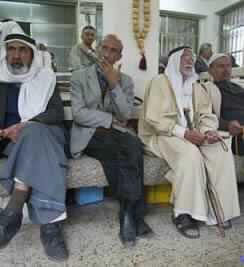- Author:
& Agencies - Section:
WORLD HEADLINES
Iraqis Gather in Mosul for Post-Saddam Election

Rival ethnic groups gathered in Iraq's third largest city on Monday to elect an interim council in the country's first vote since Saddam Hussein was ousted last month. Amid strong U.S. military security, some 250 delegates listened to a speech by the top U.S. military official in the region before parting to choose the 24-member council, which will select a mayor from three independent candidates.
As the delegates left to choose their representatives, several of them announced to the media that they were withdrawing from the election in protest at the division of delegates along ethnic lines.
The 24-member council will consist of seven Arabs, three Kurds, two Assyrian Christians, one Turkmen and one Shebak inside the city and six Arabs, one Yezidi and one Assyrian Christian outside the city, along with two former generals.
Mosul is mainly Arab with a large Kurdish minority as well as Turkmens, Assyrians and other groups. The ethnic mix fueled fears of factional fighting after a wave of looting and violence last month, but military officials are now holding it up as "model city."
Commanding General David Petraeus said he believed the protesting delegates were 'radical' Islamists who did not believe in representative government.
"By being here today you are participating in the birth of the democratic process in Iraq," Petraeus told delegates at the opening ceremony, standing below an Iraqi flag. "This is a historic occasion and an important step forward for Mosul and Iraq."
Critics fear the council might include corrupt officials who served under Saddam and new leaders with little or no popular support.
"People are watching this closely, although there are different dynamics in each city. These people are recognized as leaders by their groups even if they are not elected and it is quite an achievement to have reached this stage in 12 days," said spokesman Major Trey Cate.
**RESTORING ORDER A PRIORITY***
The three candidates for mayor are Ghanam al-Basso, a former general, medical doctor Hudhaifa Al-Dawachi, and a former chief of police, Tariq Mutab. All three are Sunni Arabs from Mosul.
"We have gone through difficult times and we need to establish order urgently," said Al-Dawachi as.
Among those observing the election was Mishaan Al-Jiburi, a controversial figure who declared himself the local governor after U.S. and Kurdish forces entered the city. However, a meeting he organized turned violent and he failed to win official recognition.
"I liberated this city and I am the governor, but I will be handing over power today to the new mayor," Al-Jiburi told Reuters, before talking of plans to lead his party in Baghdad.
U.S. military officials have said it could take up to two years before regular elections are held, based on experiences elsewhere in the world.
Despite public skepticism about the election process, there is evidence of order being restored in Mosul.
U.S. troops are patrolling with local police, banks have begun paying salaries, trains have started to run from Baghdad and there is regular, if scarce, fuel distribution.
"Now it seems life is getting back to normal. Saddam said it was difficult to control the people in this city, but if you control Mosul, you control Iraq," said retired teacher Jassem.
**PHOTO CAPTION***
Local residents chat at a traditional tea shop in Mosul, Iraq, Sunday April 27, 2003. (AP Photo/Saurabh Das)


 Home
Home Discover Islam
Discover Islam Quran Recitations
Quran Recitations Lectures
Lectures
 Fatwa
Fatwa Articles
Articles Fiqh
Fiqh E-Books
E-Books Boys & Girls
Boys & Girls  Women
Women









